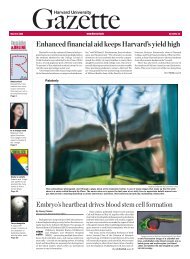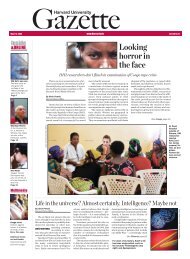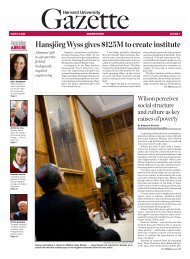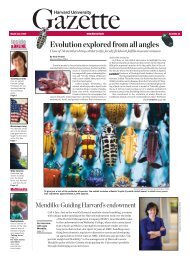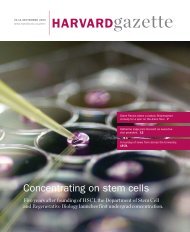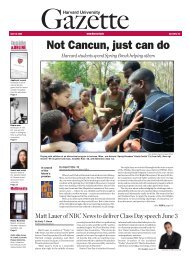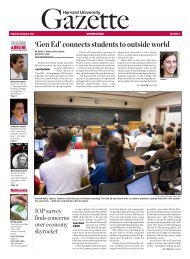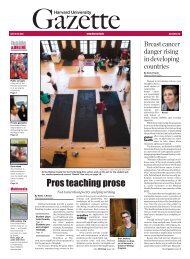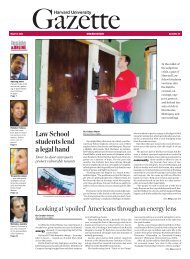Harvard University Gazette December 4-10, 2008 - Harvard News ...
Harvard University Gazette December 4-10, 2008 - Harvard News ...
Harvard University Gazette December 4-10, 2008 - Harvard News ...
You also want an ePaper? Increase the reach of your titles
YUMPU automatically turns print PDFs into web optimized ePapers that Google loves.
Early success highlights need for more progress<br />
By Alvin Powell<br />
<strong>Harvard</strong> <strong>News</strong> Office<br />
Many of the 500,000 African babies born<br />
infected with HIV each year won’t live past<br />
age 2, a fact made even more appalling by the<br />
fact that doctors know how to halt motherto-child<br />
HIV transmission.<br />
AIDS in<br />
Africa<br />
That sobering figure was<br />
just a part of the mixed picture<br />
about AIDS in Africa painted<br />
during an afternoon symposium<br />
at <strong>Harvard</strong> Medical School’s New Research<br />
Building on Nov. 19. Speakers at the<br />
event, “AIDS in Africa: Long-Term Effects of<br />
ARV Therapy,” hailed the progress made on<br />
the continent since a key conference in Durban,<br />
South Africa, in 2000, but described a<br />
still-dismal picture of an epidemic that has<br />
the upper hand despite major advances in<br />
the industrialized world.<br />
The event’s two keynote speakers, Deborah<br />
Cotton, chief medical officer of the Clinton<br />
Foundation HIV/AIDS Initiative, and<br />
Jean Paul Moatti, professor of economics at<br />
the <strong>University</strong> of the Mediterranean and an<br />
adviser to the director-general of the World<br />
Health Organization and to the executive director<br />
of the Global Fund Against AIDS, Tuberculosis<br />
and Malaria, both decried the<br />
continued transmission of HIV from infected<br />
mothers to their babies. Moatti said the<br />
number “disgusts” him, while Cotton questioned<br />
why any children are born with HIV<br />
infections at a time when medical knowledge<br />
knows how to prevent transmission.<br />
The event, which brought several hundred<br />
interested students, faculty, and experts<br />
in the field to the Joseph B. Martin<br />
Conference Center, was sponsored by the<br />
<strong>Harvard</strong> Initiative for Global Health, the<br />
<strong>Harvard</strong> School of Public Health (HSPH)<br />
AIDS Initiative, the <strong>Harvard</strong> <strong>University</strong><br />
Center for AIDS Research, and the HSPH<br />
Department of Immunology and Infectious<br />
Diseases.<br />
The event was introduced by Dyann<br />
Wirth, Strong Professor of Infectious Disease<br />
and chair of HSPH’s Department of Immunology<br />
and Infectious Diseases, and by<br />
Max Essex, Lasker Professor of Health Sciences<br />
and the head of the HSPH’s AIDS Initiative.<br />
It featured presentations by several<br />
<strong>Harvard</strong> faculty members working on the<br />
problem of AIDS in Africa as well as professionals<br />
working in the field on the problem.<br />
Essex said that ARV, or antiretroviral<br />
drug therapy, in marked contrast to vaccine<br />
efforts, has been particularly successful<br />
where it has been implemented. In places<br />
where ARV therapy has been rolled out it has<br />
been successful at increasing life span, and<br />
(See Africa, next page)<br />
<strong>December</strong> 4-<strong>10</strong>, <strong>2008</strong> <strong>Harvard</strong> <strong>University</strong> <strong>Gazette</strong>/ 9<br />
Max Essex talks about the success<br />
of antiretroviral drug therapy — and<br />
the difficulties of implementing it.<br />
Kris Snibbe/<strong>Harvard</strong> <strong>News</strong> Office<br />
Photos Nick Welles/<strong>Harvard</strong> <strong>News</strong> Office<br />
Students looking to<br />
light African night<br />
Start nonprofit to bring appropriate<br />
technology to rural Africa<br />
The goal is to get<br />
the overall cost of<br />
the device to between<br />
$<strong>10</strong> and<br />
$15, so it will be<br />
affordable to<br />
African markets.<br />
Hugo Van Vuuren<br />
By Alvin Powell<br />
<strong>Harvard</strong> <strong>News</strong> Office<br />
energy<br />
technology<br />
Some current and former <strong>Harvard</strong> students<br />
have joined forces in an effort to apply<br />
new technology to an old problem: how to<br />
light Africa’s rural areas far from modern<br />
power supplies.<br />
The six members of Leboné Solutions —<br />
named after the word for “lightstick” in a<br />
South African tribal tongue — came together<br />
in Gordon McKay Professor of the Practice<br />
of Biomedical Engineering<br />
David Edwards’<br />
class ES 147:<br />
“Idea Translation” in<br />
the fall of 2007. They are looking to use concepts<br />
developed by <strong>Harvard</strong> Assistant Professor<br />
of Organismic and Evolutionary Biology<br />
Peter Girguis, who has been working<br />
to harness the trickle of energy produced<br />
naturally by anaerobic microbes as they digest<br />
organic matter.<br />
Girguis has designed microbial fuel cells<br />
that harness electricity through insertion of<br />
an electrode into a supply of organic material<br />
— a simple bucket of soil or a pit filled with<br />
garbage. The electrode harvests electrons<br />
that the microbes would otherwise give off<br />
into the surrounding material, creating a<br />
small energy supply.<br />
In an early design, Girguis hooked the<br />
electrode up to a small circuit board that had<br />
outputs for a low-energy light bulb and for a<br />
cell phone charger, providing an important<br />
means of recharging devices that have become<br />
more and more popular even in poor,<br />
rural parts of the world.<br />
“I think [microbial fuel cell technology is]<br />
very promising, but a bit young,” Girguis<br />
said. “I look at myself as a technology driver<br />
and look for a group like Leboné to bring<br />
knowledge of the local environment and<br />
how to distribute technology as a way to get<br />
it out in the market. Leboné really has their<br />
thumb on the pulse of the energy crisis in<br />
South Africa. They know what’s going on.”<br />
Leboné plans to build off Girguis’ technology<br />
and expertise, adapting and refining<br />
the fuel cells for the specific African application,<br />
according to Leboné member<br />
Alexander Fabry, a <strong>Harvard</strong> senior. Hugo<br />
Van Vuuren, another Leboné member who<br />
graduated from <strong>Harvard</strong> College in 2007<br />
and who works in the “Idea Translation” lab,<br />
said the group is working to improve its technology<br />
and lower its cost in the wake of field<br />
research last summer in Tanzania. The goal,<br />
Van Vuuren said, is to get the overall cost of<br />
the device to between $<strong>10</strong> and $15, so it will<br />
be affordable to African markets, something<br />
he said wouldn’t happen until they begin<br />
large-scale production, hoped for in 20<strong>10</strong>.<br />
They plan to field test the device next year<br />
in Namibia.<br />
Leboné won a $200,000 World Bank<br />
grant in May and is supported by the <strong>Harvard</strong><br />
Initiative for Global Health. In addition<br />
to Van Vuuren and Fabry, Leboné is made up<br />
of Stephen Lwendo, a <strong>Harvard</strong> junior from<br />
Tanzania; David Sengeh, a <strong>Harvard</strong> junior<br />
from Sierra Leone; Zoe Vallabha, who graduated<br />
from <strong>Harvard</strong> College in 2007; and<br />
Aviva Presser, a doctoral student at <strong>Harvard</strong>’s<br />
School of Engineering and Applied<br />
Sciences.<br />
Microbial fuel cell technology is not new;<br />
it has been worked on for decades. What is<br />
new is the development of low-power light<br />
bulbs and the spread of cellular phones that<br />
need recharging into rural areas. Girguis<br />
said Leboné Solutions” strength is their understanding<br />
of the African marketplace,<br />
which would give them a leg up in creating<br />
appropriate technology.<br />
While Leboné was created around the<br />
idea of marketing a cheap, usable microbial<br />
fuel cell, Van Vuuren said that isn’t the only<br />
way they’re trying to help rural Africans.<br />
Leboné is a social enterprise organization<br />
and seeks to use markets to improve people’s<br />
lives. Van Vuuren said they’re willing to promote<br />
the technology and products of other<br />
innovators if that proves the best way.<br />
Leboné, he said, has three goals. The first<br />
is focused on the fuel cell and on efforts to<br />
create one that is practical for everyday use,<br />
is durable, and costs little enough to make it<br />
attractive to cash-constrained markets. The<br />
group’s second goal is to look for innovative<br />
applications of technology to help solve var-<br />
(See Electricity, next page)<br />
Members of the<br />
nonprofit<br />
Leboné Solutions<br />
got together<br />
at <strong>Harvard</strong>.<br />
They include<br />
David<br />
Sengeh ’<strong>10</strong><br />
(clockwise from<br />
above left),<br />
Alexander Fabry<br />
’09, and Hugo<br />
Van Vuuren ’07.



